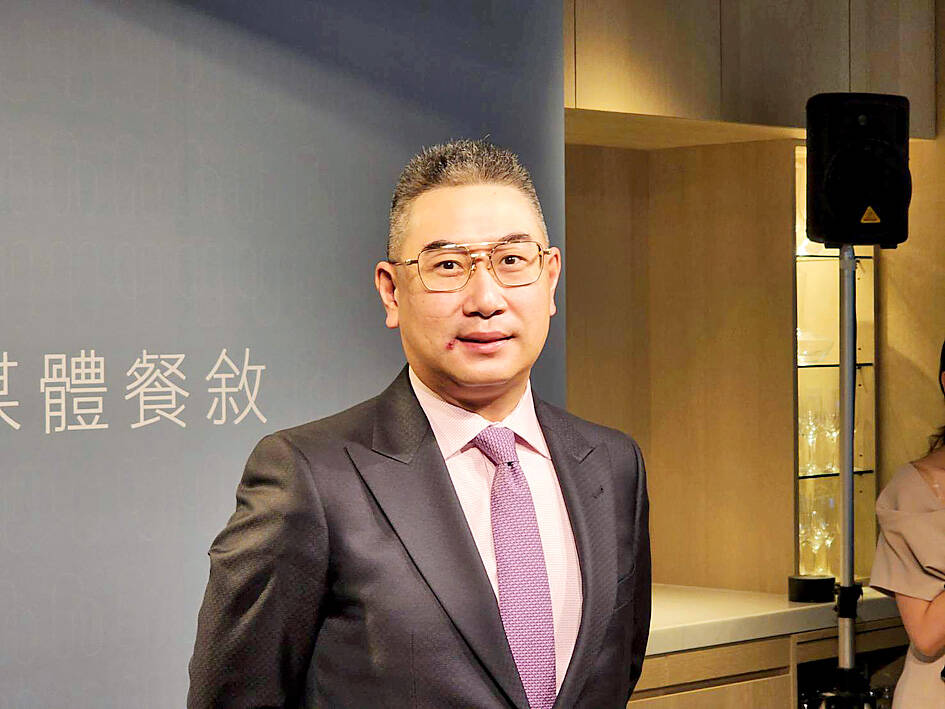Two major local hotel chains yesterday said that they are looking at further revenue improvement this quarter and beyond on the back of demand from international business travelers, meetings and exhibitions.
Wilhelm Tsai (蔡伯翰), chairman of luxury hotel operator My Humble House Hospitality Management Consulting Co (寒舍餐旅), told an annual shareholders’ meeting that occupancy rates recovered to 70 percent in the first quarter, while daily room rates stood at NT$6,500 (US$212), lifting revenue by 47.31 percent year-on-year to NT$1.2 billion, higher than the level before the COVID-19 pandemic.
First-quarter net income was NT$82 million, or earnings per share of NT$0.90, the second consecutive quarter of profit and a big jump from a year earlier, company data showed.

Photo: Wang Yi-hung, Taipei Times
Tsai attributed the impressive showing to the return of international business travelers, the main target clientele for its urban properties, after Taiwan ended border controls in October last year.
Occupancy rates at Le Meridien Taipei (台北寒舍艾美酒店) in the Xinyi District (信義) hit 80 percent last month and this month, and room rates climbed to NT$,9500, Tsai said, adding that the property and adjoining Humble House Taipei (寒舍艾麗) are also benefitting from the ongoing Computex trade show.
The event helped boost food and beverage sales, and business momentum would sustain, aided by the Dragon Boat Festival next month and healthcare conferences in July, Tsai said.
The group, which also operates Sheraton Grand Taipei Hotel (台北喜來登大飯店) near Taipei Railway Station, Humble Boutique Hotel (寒居酒店) in Taipei’s Zhongshan District (中山) and hot spring resort Mu Jiaosi Hotel (礁溪寒沐) in Yilan County, is collaborating with foreign travel agencies and other sales channels to help woo foreign tourists, he said.
Similarly, FDC International Hotels Corp (雲品國際) told its shareholders it has recovered from the COVID-19 pandemic and would put up a stronger financial performance.
FDC has signed 10 management contracts, with seven already in operation and three more to start, in line with the company’s attempt to diversify its income sources, it said.
The strategy would grow its economic scale and provide synergy in terms of cross-selling efficiency, revenue expansion and cost controls, it said.

Taiwan Semiconductor Manufacturing Co (TSMC, 台積電), the world’s biggest contract chipmaker, booked its first-ever profit from its Arizona subsidiary in the first half of this year, four years after operations began, a company financial statement showed. Wholly owned by TSMC, the Arizona unit contributed NT$4.52 billion (US$150.1 million) in net profit, compared with a loss of NT$4.34 billion a year earlier, the statement showed. The company attributed the turnaround to strong market demand and high factory utilization. The Arizona unit counts Apple Inc, Nvidia Corp and Advanced Micro Devices Inc among its major customers. The firm’s first fab in Arizona began high-volume production

VOTE OF CONFIDENCE: The Japanese company is adding Intel to an investment portfolio that includes artificial intelligence linchpins Nvidia Corp and TSMC Softbank Group Corp agreed to buy US$2 billion of Intel Corp stock, a surprise deal to shore up a struggling US name while boosting its own chip ambitions. The Japanese company, which is adding Intel to an investment portfolio that includes artificial intelligence (AI) linchpins Nvidia Corp and Taiwan Semiconductor Manufacturing Co (TSMC, 台積電), is to pay US$23 a share — a small discount to Intel’s last close. Shares of the US chipmaker, which would issue new stock to Softbank, surged more than 5 percent in after-hours trading. Softbank’s stock fell as much as 5.4 percent on Tuesday in Tokyo, its

The prices of gasoline and diesel at domestic fuel stations are to rise NT$0.1 and NT$0.4 per liter this week respectively, after international crude oil prices rose last week, CPC Corp, Taiwan (台灣中油) and Formosa Petrochemical Corp (台塑石化) announced yesterday. Effective today, gasoline prices at CPC and Formosa stations are to rise to NT$27.3, NT$28.8 and NT$30.8 per liter for 92, 95 and 98-octane unleaded gasoline respectively, the companies said in separate statements. The price of premium diesel is to rise to NT$26.2 per liter at CPC stations and NT$26 at Formosa pumps, they said. The announcements came after international crude oil prices

SETBACK: Apple’s India iPhone push has been disrupted after Foxconn recalled hundreds of Chinese engineers, amid Beijing’s attempts to curb tech transfers Apple Inc assembly partner Hon Hai Precision Industry Co (鴻海精密), also known internationally as Foxconn Technology Group (富士康科技集團), has recalled about 300 Chinese engineers from a factory in India, the latest setback for the iPhone maker’s push to rapidly expand in the country. The extraction of Chinese workers from the factory of Yuzhan Technology (India) Private Ltd, a Hon Hai component unit, in southern Tamil Nadu state, is the second such move in a few months. The company has started flying in Taiwanese engineers to replace staff leaving, people familiar with the matter said, asking not to be named, as the